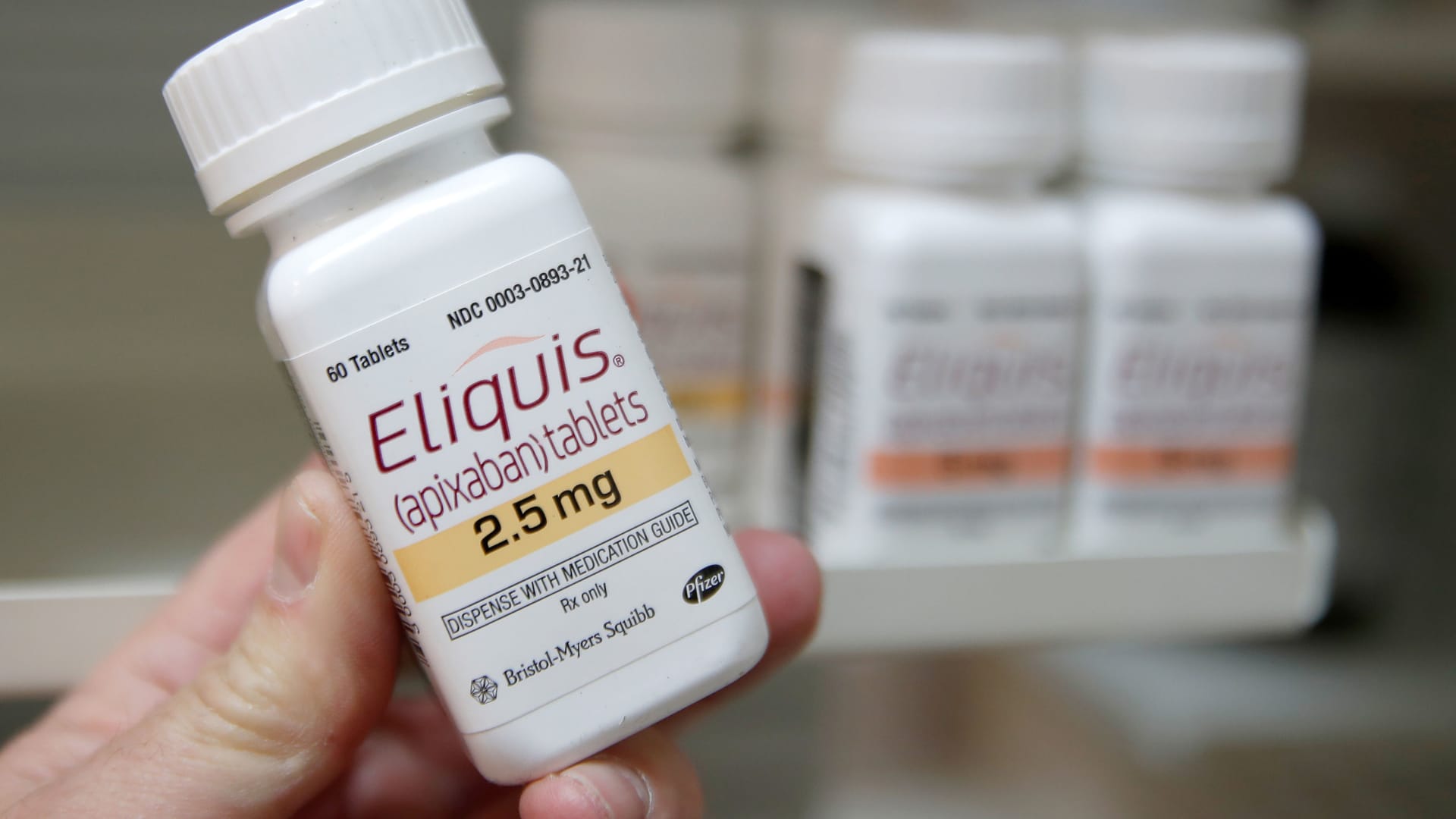
A pharmacist holds a bottle of the drug Eliquis, made by Pfizer Pharmaceuticals, at a pharmacy in Provo, Utah, January 9, 2020.
George Frey | Reuters
All drugmakers of the first 10 medicines selected for Medicare drug price negotiations have agreed to participate in the talks, even after many of them sued to halt the process last month.
The companies confirmed their participation in separate statements to CNBC. The Centers for Medicare & Medicaid Services did not immediately respond to a request to confirm that all drugmakers agreed to the talks.
President Joe Biden‘s Inflation Reduction Act, which passed last year, empowered Medicare to negotiate drug prices for the first time in the program’s six-decade history. The lengthy negotiation process won’t end until August 2024, with reduced prices going into effect in January 2026.
Sunday was the deadline for all 10 pharmaceutical companies to sign an agreement to engage in the negotiations, which aim to make costly medications more affordable for older Americans.
Monday, meanwhile, is the deadline for those companies to submit economic and market information on their drugs, including research and development costs and sales and revenue data.
Here are the 10 drugs and the companies that manufacture them:
- Eliquis, made by Bristol Myers Squibb, is used to prevent blood clotting, to reduce the risk of stroke.
- Jardiance, made by Boehringer Ingelheim, is used to lower blood sugar for people with Type 2 diabetes.
- Xarelto, made by Johnson & Johnson, is used to prevent blood clotting, to reduce the risk of stroke.
- Januvia, made by Merck, is used to lower blood sugar for people with Type 2 diabetes.
- Farxiga, made by AstraZeneca, is used to treat Type 2 diabetes.
- Entresto, made by Novartis, is used to treat certain types of heart failure.
- Enbrel, made by Amgen, is used to treat rheumatoid arthritis.
- Imbruvica, made by AbbVie, is used to treat different types of blood cancers.
- Stelara, made by J&J subsidiary Janssen, is used to treat Crohn’s disease.
- Fiasp and NovoLog, made by Novo Nordisk, are insulins.
Many of the drugmakers contend that they had no real choice but to participate in the negotiations, specifically due to the penalties they could face if they choose not to.
If drugmakers decline to engage in the negotiations, they could be forced to pay an excise tax of up to 95% of their medication’s U.S. sales or to pull all of their products from the Medicare and Medicaid markets, according to CMS.
“We have no choice other than to sign the ‘agreement.’ If we did not sign, we’d be required to pay impossibly high penalties unless we withdraw all of our medicines from Medicare and Medicaid. That is not a real choice,” a spokesperson for Bristol Myers Squibb told CNBC ahead of the Sunday deadline.
That statement echoes the arguments outlined in at least nine separate lawsuits drugmakers filed against the Biden administration in recent months seeking to declare the negotiations unconstitutional.
The pharmaceutical industry also argues that the process will threaten revenue growth, profits and drug innovation.
However, analysts expect minimal financial losses for companies, at least initially, since most of the drugs selected already face upcoming patent expirations that will likely weigh on revenue.
What happens next?
This fall, CMS will host one meeting with all 10 companies so they can provide context for the data they submitted by Monday.
CMS will also host listening sessions with consumer and patient organizations to obtain information the agency can use to develop its initial price offers for the selected drugs.
CMS will then make an initial price offer to manufacturers in February, and the companies have a month to accept or make a counteroffer.
The negotiations will end in August, with agreed-upon prices published on Sept. 1, 2024. The reduced prices won’t go into effect until Jan. 1, 2026.
After the initial round of talks, CMS can negotiate prices for another 15 drugs for 2027 and an additional 15 in 2028. The number rises to 20 negotiated medications a year starting in 2029 and beyond.
CMS will only select Medicare Part D drugs for the medicines covered by the first two years of negotiations. It will add more specialized drugs covered by Medicare Part B, which are typically administered by doctors, in 2028.
The drug price talks are expected to save Medicare an estimated $98.5 billion over a decade, according to the Congressional Budget Office.
The negotiations are also anticipated to save money for people enrolled in Medicare, who take an average of four to five prescription drugs a month and increasingly face out-of-pocket costs that many struggle to afford.







